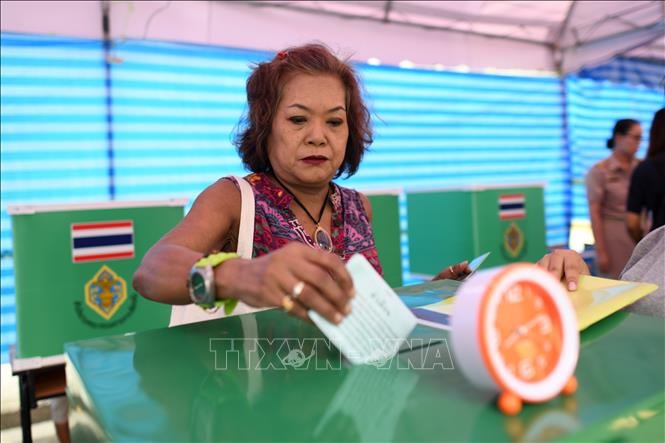Thailand officially begins general elections
From 8am on March 24 (local time), more than 50 million Thai voters have started to vote to choose the country's new leader. This is also the first election under the new 2017 Constitution and will mark a transition to re-establishing an elected government. 92,320 polling stations across Thailand have been opened.
 |
| Thai voters cast their ballots in the general election at a polling station in Bangkok on March 24, 2019. Photo: AFP/ VNA |
In addition, this will also be the first election since the death of the influential King Bhumibol Adulyadej, or Rama IX, on October 13, 2016, and the government formed after the election will be approved by King Maha Vajiralongkorn, who will also be officially crowned next May.
A total of 81 political parties are contesting the election, and thousands of candidates will be running to represent 350 constituencies. In addition, 150 other members of the House of Representatives will be elected from party lists under a system called proportional representation.
According to the new election law, this general election will apply the “Mixed Electoral System”.
In addition to electing members of the House of Representatives by constituency, the total number of valid votes cast by voters will be divided equally among the 500 seats to arrive at an average number of voters for each seat. Based on this, the votes cast for each party nationwide will be added up and divided by the above ratio to arrive at the number of seats that the party can have. From there, members of the House of Representatives will be selected according to the pre-registered party list.
Unlike the previous election, when the leader of the winning party or coalition automatically became Prime Minister, now the Prime Minister is elected by 750 Senators and Representatives in a joint meeting when the new parliament convenes.
Notably, the military will still have a high degree of influence over any government that comes to power after the election. The National Council for Peace and Order (NCPO) has the power to select and appoint 250 senators whose votes could determine who becomes the next prime minister.
The leading candidates include Pheu Thai candidate Sudarat Keyuraphan from the Pheu Thai Party, young billionaire Thanathorn Juangroongruangkit from the Future Forward Party and former Prime Minister Abhisit Vejjajiva from the Democrat Party. Notably, the race for the prime minister's seat this time includes incumbent Prime Minister General Prayut Chan-ocha, who led a coup to overthrow the civilian government in 2014. Prayut Chan-ocha is the candidate of the Palang Pacharat Party, a newly formed party but with the support of many former generals and military officers. In the last election in 2011, Ms. Yingluck Shinawatra led the Pheu Thai Party to win the majority of votes. She became Prime Minister of Thailand before being ousted.
Polling stations will close at 5 p.m. and preliminary election results are expected to be announced at 8 p.m. the same day./.

